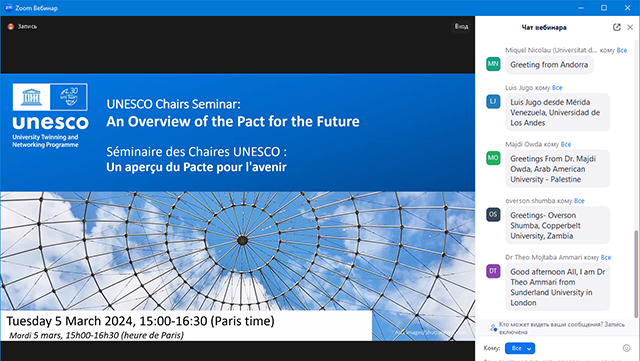
First UNESCO Chairs Seminar provides overview of zero draft of Pact for the Future
On March 5, 2024, the ICD staff attended the first UNESCO Chairs Seminar in the series of online UNESCO Chairs Seminars, Towards a Pact for the Future. Speakers in this seminar provided an overview of the zero draft of the Pact for the Future.
Representatives from UNESCO chairs and other experts had the opportunity to react to the zero draft, which comprises a chapeau and the following Chapters:
- Sustainable Development & Financing for Development
- International Peace and Security
- Science, Technology and Innovation and Digital Cooperation
- Youth and Future Generations
- Transforming Global Governance.
In particular, the UNESCO chairs’ representatives and invited experts discussed the zero draft Pact for the Future. They considered how UNESCO chairs and research partners could engage with these issues from their diverse intellectual and geographic vantage points. According to Keith Holmes, Research Coordinator for the UNITWIN/UNESCO Chairs Programme in the Future of Learning and Innovation Division at UNESCO, 310 attendees joined the introductory seminar.
Making opening remarks, Sobhi Tawil, Director of the UNESCO Future of Learning and Innovation Division, pointed out that this Pact offers an excellent opportunity to reimagine the future.
Caroline Siebold, Executive Officer of the UNESCO Bureau of Strategic Planning, emphasized in her address that the Pact embodies a collective wisdom. In this context, UNESCO chairs need to infuse new dynamism into the pursuit of Sustainable Development Goals.
Charles Hopkins, UNESCO Chair in Reorienting Education towards Sustainability, York University, Canada, drew attendees’ attention to the fact that the draft Pact says a little about the role of education.
Echoing Mr. Hopkins’ sentiments, Vernor Muñoz Villalobos, Head of Policy & Advocacy at the Global Campaign for Education and representative of the Education and Academia Stakeholder Group (EASG), Costa Rica, said that a human rights-based approach to education is critical. He also stressed that political agreements must stop to be just good intentions, therefore the Pact will require monitoring.
During the discussion on the draft Pact, Susan Osireditse Keitumetse, UNESCO Chair on African Heritage Studies and Sustainable Development, University of Botswana, remarked that the document is actually missing the role of culture, which is important in building sustainable communities. She contended that academic circles should use culture to innovate.





